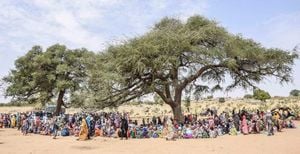Recent tensions between India and Canada have escalated dramatically following violent incidents at a Hindu temple located in Brampton, Ontario. The turmoil has drawn sharp condemnations from both nations' leaders, reflecting the growing divide over issues related to Sikh separatism and safety concerns within their respective communities.
Indian Prime Minister Narendra Modi did not hold back, labeling the recent attack on the Hindu Sabha Mandir as a "deliberate act" of aggression. This incident, reportedly involving Sikh activists, has provoked outrage among Indian officials and citizens alike, stirring fears within the Hindu community abroad. Modi expressed his indignation, stating, "I strongly condemn the deliberate attack on a Hindu temple in Canada," emphasizing the gravity of the situation.
The violent clash, which occurred during protests outside the temple, led to significant unrest. Footage circulating on social media depicted individuals waving Khalistan flags—symbols associated with the movement advocating for a separate Sikh state—and clashing with groups carrying Indian flags. Reports indicate several fistfights broke out, raising serious concerns about the safety of Hindu worshippers and diplomatic personnel.
Authorities have since confirmed the arrest of three individuals connected to the violence, with charges including assault with a weapon and assaulting police officers. Peel Regional Police stated their commitment to addressing the disturbances, as tensions continue to bubble underneath the surface of the already strained diplomatic relations between India and Canada.
What's particularly troubling is the backdrop of these events: Canada is home to one of the largest Sikh populations outside of India, many of whom are actively involved in the Khalistan movement. Relations soured last year after allegations arose concerning the killing of Hardeep Singh Nijjar, a prominent Khalistan activist, on Canadian soil, believed to have been orchestrated by Indian authorities. This accusation prompted Canada’s Prime Minister Justin Trudeau to confront India on what he characterized as violations of Canadian sovereignty.
Even as Modi and Trudeau exchanged sharp words over the incident, the rising fear among Hindu Canadians has become palpable. Many feel unsafe participating in their cultural and religious practices. Arunesh Giri, president of the Canadian Hindu Foundation, addressed the growing concerns when he stated, "The Hindu community in Canada is feeling like they are not being provided a safe place for worship." His organization has since called for solidarity rallies, urging supporters to demonstrate unity among Hindu Canadians, striving for reassurance and protection from the government.
Meanwhile, the Indian government has responded firmly, condemning what it views as extremist actions by certain groups within Canada. India's Ministry of External Affairs demanded protection for all places of worship and called for accountability concerning violent activities directed at its diplomats. Modi reiterated India's resolve, noting, "Such acts of violence will never weaken India's resolve." This strong language signals New Delhi’s determination to address what it sees as threats not only to its diplomatic mission but also to the larger Hindu community abroad.
Throughout this diplomatic spat, the everyday lives of Indian expatriates and their Hindu counterparts have been heavily impacted. Many are urging Canadian authorities to prioritize their safety as much as they do for the Sikh community. Modi's statements capture this sentiment as he insists on equal treatment concerning the rights and security of all communities within Canadian borders. "We expect the Canadian government to guarantee justice and uphold the rule of law," he added.
The clash has highlighted underlying tensions linked to the growing influence of separatist movements within Canadian society—a reflection of both the historic grievances of the Sikh community and the persistent actions of those aiming to destabilize Indian authority. Activists for Khalistan argue their efforts are born from historical injustices and seek legitimate recognition, but the current upheavals raise questions about the wide-reaching impacts of their demands on immigrant communities and international relations.
While many Canadians show solidarity with Sikh activists, Modi’s government is adamant about confronting the reality of the separatist movement. They accuse the Canadian government of turning a blind eye to what they describe as radical elements thriving on Canadian soil. New Delhi's officials have claimed they will not tolerate any activities perceived to support separatism or incite violence—no matter the community they originate from.
The recent attacks on Hindu temples are just one manifestation of the broader challenges posed by differing objectives and ideologies between these two nations. Observers express concern over potential repercussions as both countries continue to deal with their internal strife. Despite the friendly diplomatic outreach between Trudeau and Modi’s administrations, the underlying mistrust is evident.
This diplomatic drama is compounded by the rising cases of violent protests and public safety concerns among the Indian diaspora. The tensions risk spiraling out of control if not managed effectively, leading to wider societal fractures within Canada itself.
Some community leaders believe now is the time for proactive engagements to quell potential violence before it spreads, urging Canadian officials to engage with both Sikh and Hindu communities to find common ground. This could help pave the way for increased reassurance for the Hindu community, who, like Sikhs, also have deep-rooted ties to their culture, and preventing future escalations is beneficial for societal harmony.
According to Arunesh Giri, active dialogue is necessary to address the issues at hand. "We urge our leaders to hear the concerns of all communities equally, without bias," he argued, emphasizing the need for unity against extremism, irrespective of the group involved. Many agree there’s strength—unity often fosters security, and for the various ethnic communities within Canada, finding reconciliation plays a pivotal role.
The question now arises: can Canada create the needed safe spaces for all communities to practice their faith without fear? Or will the rising tides of extremism continue to fracture what is known as the multicultural fabric of Canada? Only time will tell whether these recent events catalyze real change or lead to continued discord.



